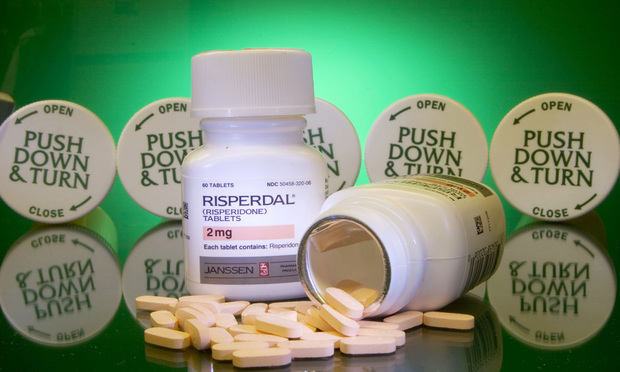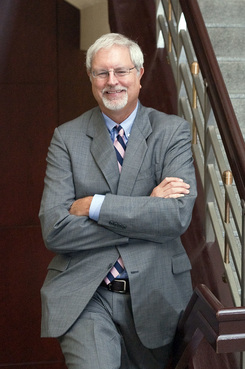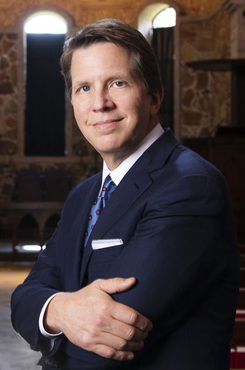'Jurors Want to Punish': Why a Jury Verdict Goes 'Nuclear'
Lawyers and legal experts list a host of reasons for larger jury awards such as the $8 billion Risperdal verdict last week, including evolving societal norms, changes in the plaintiffs bar and the actions of defendants.
October 17, 2019 at 05:10 PM
10 minute read
 Schizophrenia drug Risperdal. Photo: Bloomberg
Schizophrenia drug Risperdal. Photo: Bloomberg
The $8 billion Risperdal verdict last week against Johnson & Johnson raised an increasingly common question: What convinces jurors to come back with such stratospheric awards?
The answer is not that simple. Lawyers and legal experts list a host of reasons: evolving societal norms, changes in the plaintiffs bar and the actions of defendants. Most agree that though billion-dollar verdicts have not necessarily increased in frequency, jury awards in general are getting larger.
"We're in a much more deeply skeptical world than we were a generation ago," said David Logan, a professor at Rogers Williams University School of Law. "The larger narrative is people feel left behind. They feel aggrieved generally, and this is their chance to send a message about how much society has gone off the rails, in some respect."
Although plaintiffs lawyers would likely disagree, Logan said jurors are responding to grievances in their own lives and not the evidence of the case. "That means in the jury box when they hear about billions of dollars in profit, and they're not seeing their lives getting appreciatively better with their efforts, it's somebody else's money. Let's send a message by awarding it."
 Professor David Logan of Roger Williams University School of Law in Rhode Island.
Professor David Logan of Roger Williams University School of Law in Rhode Island.Plaintiffs lawyers have a slightly different take. They insist that the actions of large corporate defendants, many of which make billions of dollars, warrant the larger verdicts, which juries are more than willing to award.
"In cases where the jurors 'get it,' where they understand what has gone wrong and a true reckless disregard of what it will do, jurors want to punish," wrote Houston trial lawyer Mark Lanier in an email. "And how do you punish and get the attention of a hundreds or billion-dollar company? With billions of dollars."
Jurors Are Fed Up
To be sure, billion-dollar verdicts are not new. Benjamin McMichael, an assistant professor at the University of Alabama School of Law, who is an expert on punitive damages, has compiled statistics in what he called "blockbuster punitive damages awards," or those of $100 million or greater, which have been "floating around since the late 1990s." For instance, juries awarded $28 billion against Philip Morris in 2002 and $4.7 billion against General Motors in 1999.
The recent spate of billion-dollar verdicts includes the Risperdal award, as well as a $2 billion verdict against Bayer over Monsanto's Roundup herbicide earlier this year. Last year, a St. Louis jury came out with a $4.7 billion verdict against Johnson & Johnson in a case alleging its talcum powder products caused ovarian cancer.
Those cases, however, have some unique facts that influenced the outcome. In the Risperdal trial, for instance, the jury was the first in that mass tort in Philadelphia to consider punitive damages. The talc trial involved the claims of 22 women; previous ovarian cancer verdicts involved a single plaintiff.
Some in the defense bar and insurance industry, however, point to a rise in what they call "nuclear verdicts," or those that end up to be substantially more than what lawyers had expected. Lawyers generally consider those awards to be more than $10 million, but not necessarily in the billions of dollars.
To better prepare for them, lawyers have brought in jury consultants and conducted mock trials to understand what is in the minds of jurors.
"This phrase is relatively new to describe what previously was called 'runaway' verdicts," said Jeffrey O'Hara, of Connell Foley in Newark, New Jersey, who is speaking about "nuclear verdicts" to the Essex County Bar Association on Thursday. "It's a creative, visually descriptive term to describe when a verdict results in monumentally greater proportions than anybody forecast. In many cases, nobody has forecast the type of epic verdicts coming out now."
Los Angeles plaintiffs lawyer Brian Panish, of Panish Shea & Boyle was skeptical about a rise in "nuclear verdicts" and suggested that insurance firms and the defense bar were low-balling or undervaluing cases, perhaps underestimating the venue or the lawyer on the other side.
Both sides agree, however, that today's jurors have a greater distrust of corporate America.
"What used to be fallback position that companies like Johnson & Johnson are the backbone of the economy, reputable companies and good citizens, that narrative isn't out there anymore for companies, even like Johnson & Johnson, which had perhaps the best reputation of any pharmaceutical company around until recently," Logan said.
The sentiment that protected corporate defendants in prior years has disappeared, he said. He even questioned how much of the tort reform mantra from the late 1990s and early 2000s still resonated in the minds of jurors.
"It's not because they're worse, but because their timing is bad," Logan said of today's corporations, like Johnson & Johnson. "They're being hailed in front of juries in an environment where the guardrails are not there."
Panish disagreed. He said jurors are increasingly familiar with corporate wrongdoing. When it comes to punitive damages, the idea is to punish a corporation and deter it from future wrongdoing, "and the only way that jurors can deter and punish is with a substantial sum of money," he said.
"People see it, and they're much more skeptical, because they've seen prior incidences of this happening, and it's not just Roundup or Risperdal," Panish said.
Money Talks
Jurors also have less hesitation to award greater dollars because the concept of money has changed, and plaintiffs lawyers do not hesitate to ask for it.
"The concept of money has changed dramatically," said Lew Bricker of SmithAmundsen in Chicago. "And people start to lose the value of what money means in a larger context. I can tell you what $1 means to you, and to me. But, when talking about $1 to a company or insurance company or an individual that's not you, it means something very different. And people are less conservative about how they're viewing that."
Many lawyers pointed to jurors' everyday exposure to references about large dollars, like the movie "Joker" grossing $140 million, or Los Angeles Rams quarterback Jared Goff signing a $134 million extension to his contract.
Plaintiffs lawyers also are bolder about asking for such figures.
"They've become much more dramatic like the rest of society has, and they feel empowered to ask for larger numbers and not fear retribution that you used to see in the past," Bricker said.
In the Risperdal trial, for example, Philadelphia plaintiffs lawyer Thomas Kline of Kline & Specter wasn't permitted to ask the jury for a specific dollar amount but repeatedly used the word "billions" to describe not only Johnson & Johnson's net worth, but also the company's revenue forecast for marketing the drug, and the amount the company made from the medication.
"Everything about this case, about this drug, was measured in billions," Kline told the jury.
The plaintiffs bar also has more resources than ever, having built their financial success on cases against asbestos firms or Big Tobacco. That means plaintiffs can go head to head against the legal defense teams of large corporations.
Panish said that the plaintiffs bar is more willing to share resources with younger attorneys, including documents and experts, and have become "masters of their craft."
"These lawyers are getting really good and doing a good job in presenting their case," Panish said. "The argument for the plaintiff is the only way to make change is hit them in the pocketbook where they feel it the same, and that's what they're trying to do."
In general, billion-dollar verdicts don't just show up in any trial. They often involve injuries or illness, often in the pharmaceutical, automotive or medical device industries.
"The consistent thing that you're going to see in all these cases are a bad injury," Panish said. "You have really good plaintiffs counsel and bad documents on a corporate defendant that is alleged to put profits over safety."
McMichael said corporations that sell a product focused on someone's health, whether it's pharmaceuticals or chemical exposure, are more susceptible than others, such as lawsuits over investor losses.
"They tend to create the right kinds of plaintiffs," he said. "It's easier if I'm on a jury and see a plaintiff wasting away from cancer because of a drug he or she took, or a chemical he or she was exposed to."
But it's not just about the plaintiffs. In many recent jury awards of more than $1 billion, jurors heard evidence not of mere negligence but of alleged misconduct over long periods of time that harmed many people, often seriously, Logan said. To jurors, that looks like the corporate defendants are covering up their wrongdoing, even if they were merely asserting their right to challenge regulatory actions, he said.
"If you're a corporation and you've got to deal with a heavily regulated environment like Johnson & Johnson does, you've got the right to resist bureaucratic attempts to change the way you market your products," he said. "You play that in front of a jury, and it sounds to them like it's a cover-up."
 Mark Lanier, with The Lanier Law Firm.
Mark Lanier, with The Lanier Law Firm.Plaintiffs lawyers insist the cover-ups are far from imaginary. Lanier, who has won multiple verdicts of $1 billion or more, including last year's $4.7 billion talcum powder verdict, won a $9 billion award over diabetes drug Actos in 2014 in which the federal judge overseeing the trial sanctioned one of the defendants, Takeda Pharmaceuticals, for deleting key evidence. She refused to toss the jury's award "given the evidence presented of a high degree of reprehensibility of the defendants' conduct and the need to adequately deter such conduct in the future."
But, as is the case for most billion-dollar verdicts, the judge reduced the punitive damages to $37 million due to constitutional concerns. The judge in the Roundup verdict also reduced the award to $86.7 million, despite finding "clear and convincing evidence" that Monsanto's actions were "reprehensible" and showed a "conscious disregard for health."
But those reductions don't dissuade jurors from awarding billion-dollar verdicts.
"Jurors also typically understand that those awards are usually cut back and they are looking to make a statement of how atrocious the behavior has been," Lanier wrote.
This content has been archived. It is available through our partners, LexisNexis® and Bloomberg Law.
To view this content, please continue to their sites.
Not a Lexis Subscriber?
Subscribe Now
Not a Bloomberg Law Subscriber?
Subscribe Now
NOT FOR REPRINT
© 2025 ALM Global, LLC, All Rights Reserved. Request academic re-use from www.copyright.com. All other uses, submit a request to [email protected]. For more information visit Asset & Logo Licensing.
You Might Like
View All

4th Circuit Upholds Virginia Law Restricting Online Court Records Access
3 minute read
Plaintiffs Attorneys Awarded $113K on $1 Judgment in Noise Ordinance Dispute
4 minute readTrending Stories
Who Got The Work
J. Brugh Lower of Gibbons has entered an appearance for industrial equipment supplier Devco Corporation in a pending trademark infringement lawsuit. The suit, accusing the defendant of selling knock-off Graco products, was filed Dec. 18 in New Jersey District Court by Rivkin Radler on behalf of Graco Inc. and Graco Minnesota. The case, assigned to U.S. District Judge Zahid N. Quraishi, is 3:24-cv-11294, Graco Inc. et al v. Devco Corporation.
Who Got The Work
Rebecca Maller-Stein and Kent A. Yalowitz of Arnold & Porter Kaye Scholer have entered their appearances for Hanaco Venture Capital and its executives, Lior Prosor and David Frankel, in a pending securities lawsuit. The action, filed on Dec. 24 in New York Southern District Court by Zell, Aron & Co. on behalf of Goldeneye Advisors, accuses the defendants of negligently and fraudulently managing the plaintiff's $1 million investment. The case, assigned to U.S. District Judge Vernon S. Broderick, is 1:24-cv-09918, Goldeneye Advisors, LLC v. Hanaco Venture Capital, Ltd. et al.
Who Got The Work
Attorneys from A&O Shearman has stepped in as defense counsel for Toronto-Dominion Bank and other defendants in a pending securities class action. The suit, filed Dec. 11 in New York Southern District Court by Bleichmar Fonti & Auld, accuses the defendants of concealing the bank's 'pervasive' deficiencies in regards to its compliance with the Bank Secrecy Act and the quality of its anti-money laundering controls. The case, assigned to U.S. District Judge Arun Subramanian, is 1:24-cv-09445, Gonzalez v. The Toronto-Dominion Bank et al.
Who Got The Work
Crown Castle International, a Pennsylvania company providing shared communications infrastructure, has turned to Luke D. Wolf of Gordon Rees Scully Mansukhani to fend off a pending breach-of-contract lawsuit. The court action, filed Nov. 25 in Michigan Eastern District Court by Hooper Hathaway PC on behalf of The Town Residences LLC, accuses Crown Castle of failing to transfer approximately $30,000 in utility payments from T-Mobile in breach of a roof-top lease and assignment agreement. The case, assigned to U.S. District Judge Susan K. Declercq, is 2:24-cv-13131, The Town Residences LLC v. T-Mobile US, Inc. et al.
Who Got The Work
Wilfred P. Coronato and Daniel M. Schwartz of McCarter & English have stepped in as defense counsel to Electrolux Home Products Inc. in a pending product liability lawsuit. The court action, filed Nov. 26 in New York Eastern District Court by Poulos Lopiccolo PC and Nagel Rice LLP on behalf of David Stern, alleges that the defendant's refrigerators’ drawers and shelving repeatedly break and fall apart within months after purchase. The case, assigned to U.S. District Judge Joan M. Azrack, is 2:24-cv-08204, Stern v. Electrolux Home Products, Inc.
Featured Firms
Law Offices of Gary Martin Hays & Associates, P.C.
(470) 294-1674
Law Offices of Mark E. Salomone
(857) 444-6468
Smith & Hassler
(713) 739-1250









